© Car Adviser 2024 - All rights reserved.
> Home / Buying A Car / Best Electric SUVs 2024: Power Up Your Drive
The SUV is a classic car choice for those needing space, practicality, and a super safe car to drive and transport people. While petrol and diesel options remain the more popular version of these cars, their electric counterparts are growing in popularity thanks to their low running costs and good performance.
That said, there are now a lot of different electric SUVs to choose from, and not all of them are good. To help you make the right choice, Car Adviser has put together a guide to the best electric SUVs you can get in the UK.
These are the top 10 UK electric SUVs you can buy in 2024:
Many features make an electric SUV a great option. Despite being a practical and economical class of car, only some of the models are going to be the best option for you, as some are going to have limitations.
That’s why you need to consider a few different factors to ensure that you’re choosing one of the best electric SUVs you can get. By analysing each potential car against these criteria, you’ll be able to assess the suitability of the vehicle better.
One of the first things you should look for in an electric SUV is the car’s range per charge. Electric SUVs will be more practical the more mileage it has, go getting one with a good range will allow you to make longer or more frequent trips with the vehicle before it needs to be charged again.
If you find a car that you love that may have a poor range, see if it comes with fast charging. This way, the need to recharge frequently may not be as bad, as you’ll be able to hit the road again quickly.
In addition to the range of the electric motor, you should also consider the power. Some electric cars struggle compared to vehicles that use a traditional fuel type, meaning they may not accelerate well or have a low top speed.
When looking for the best electric SUV, you want a car that has good performance and offers a nice amount of power. Test any potential electric SUVs to see if they’re powerful enough to deal with hills; otherwise, you’ll find yourself with a vehicle that falls away from the traffic around it.
As these cars use the SUV body type, you also want to ensure that the vehicles are comfortable and provide enough space for passengers and luggage. The large motor in electric SUVs could take up some boot space, so be sure to check to ensure that it’s still a practical car for you.
The interior should also be nice, with comfortable seats, and the body should let in as little road noise as possible. Of course, electric SUVs are quieter, but the best options will also be able to cancel out the sound produced by other vehicles.
With these factors in mind, we here at Car Adviser have looked at the electric SUV market to find the best options for you.
Here’s a detailed look at the top 10 best electric SUVs you should consider.:
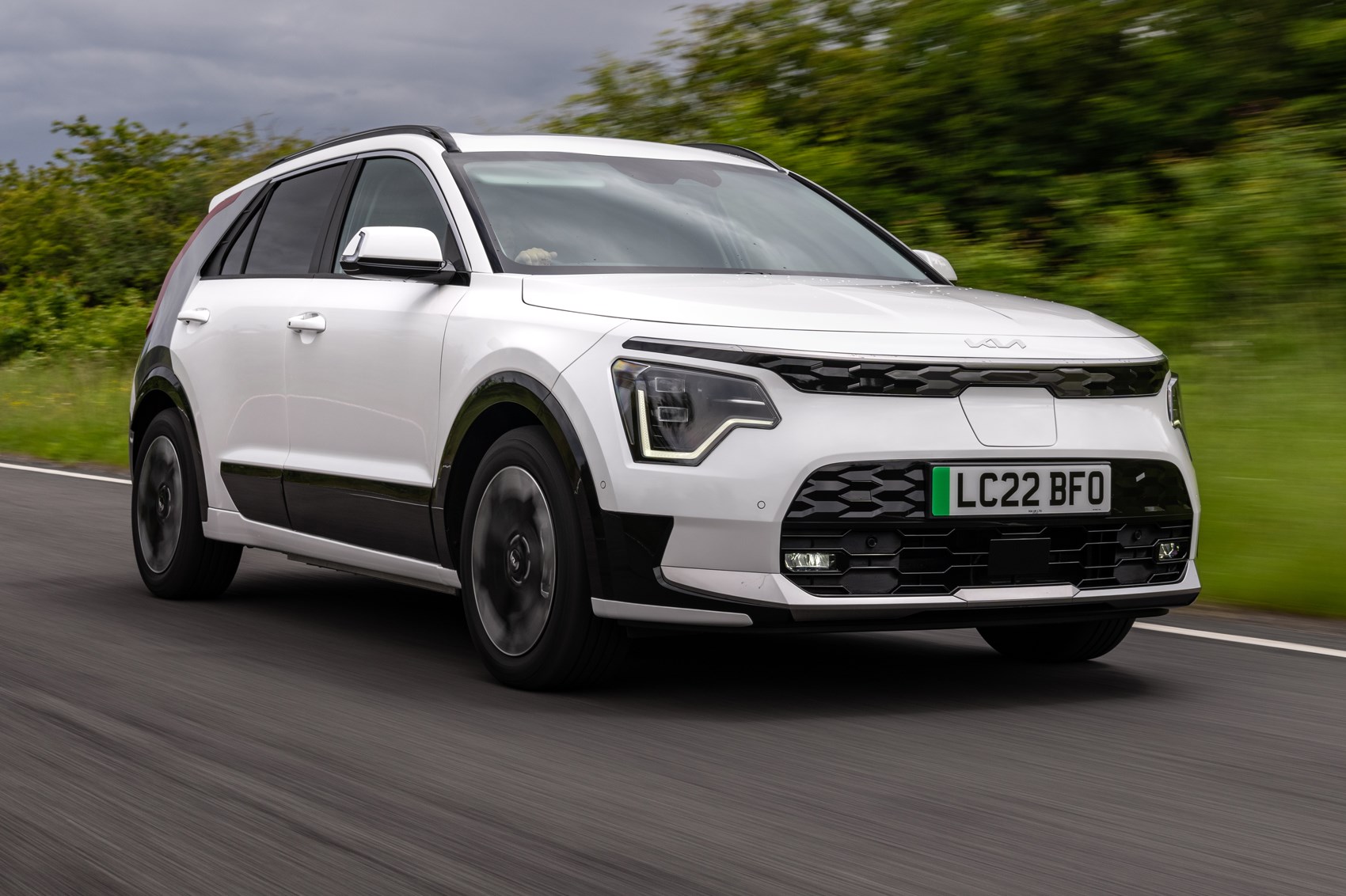
If you want an electric SUV that follows the general consensus, there’s no better model than the Kia Niro EV. Thought by many car reviewers as the best SUV option, the Kia Niro offers above-average mileage per charge of 285 miles and comes with meager running costs.
As a safe car, the Kia Niro is cheap to insure and is also made by a reliable manufacturer, meaning that breakdowns are unlikely and infrequent.
If you’re focused on sustainability, the Niro EV has an interior made from faux-leather seats and uses recycled materials throughout.
The car goes reasonably well, with good acceleration and responsive breaking, and can handle pretty well for a vehicle of this size. It’s got a good-sized boot offering 475 litres that should do the job and ample space for many passengers.
Other electric SUVs offer more space, but you’ll have to pay more than the Kia to get it. For most, the Kia Niro EV is the best electric SUV available.
Pros
Cons

Over the last few years, the models offered by Nissan have been a bit mediocre and forgettable. However, with the Ariya SUV, they’ve produced something uncharacteristically stylish and comfortable.
While most electric cars dive headfirst into neo-futuristic designs, the Nissan is rooted in tradition, using a wooden dashboard and cross-stitch seats that make the interior look elegant.
The car is also good under the hood, with a well-sized 63kWh motor that adds a nice amount of thrust when accelerating. The vehicle has a standard 250 miles range per charge, which jumps to over 300 miles with their higher-range version. This makes it an excellent SUV for darting family members around town, although it does have the potential to be suitable for a long-distance trip too.
The Ariya can be expensive if you get the version with all the trimmings, which is annoying. Still, even the entry-level option comes with heated seats, climate control, and some great safety features that make it a good choice for families.
Pros
Cons
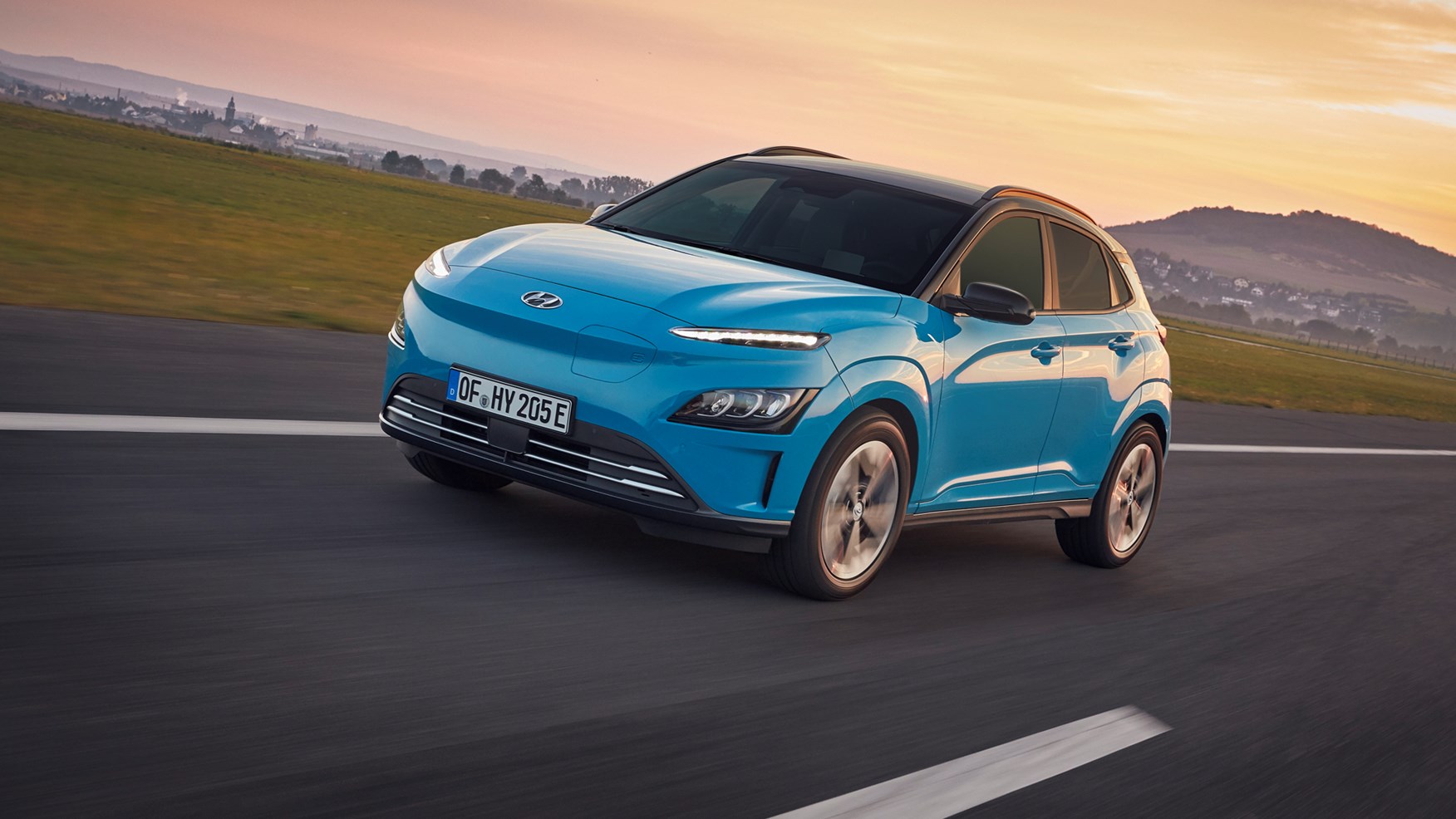
The Hyundai Kona is similar to the Kia e-Niro, which shares many of its parts. The e-Niro is thought to be a good electric car, making the Kona electric a very suitable and reliable electric SUV too.
The Hyundai isn’t the most exciting vehicle to drive, a trend for electric cars that will be broken soon, but it’s an excellent option for those looking for a reliable electric vehicle. It has a great range of around 300, meaning that it will last a long time between changes, and you can also get a cheaper albeit weaker version that has 200 miles per charge, which is great if you’re going to use it to dart around town.
The Kona Electric is the fastest version of this model, out speeding both the petrol and diesel by reaching 60 miles per hour in around 7.5 seconds. It’s also quick to charge, as it only takes 75 minutes to reach 80% capacity when charged at a petrol station.
Hyundai also offers a long five-year warranty, which gives excellent peace of mind that the car is built to last.
Pros
Cons
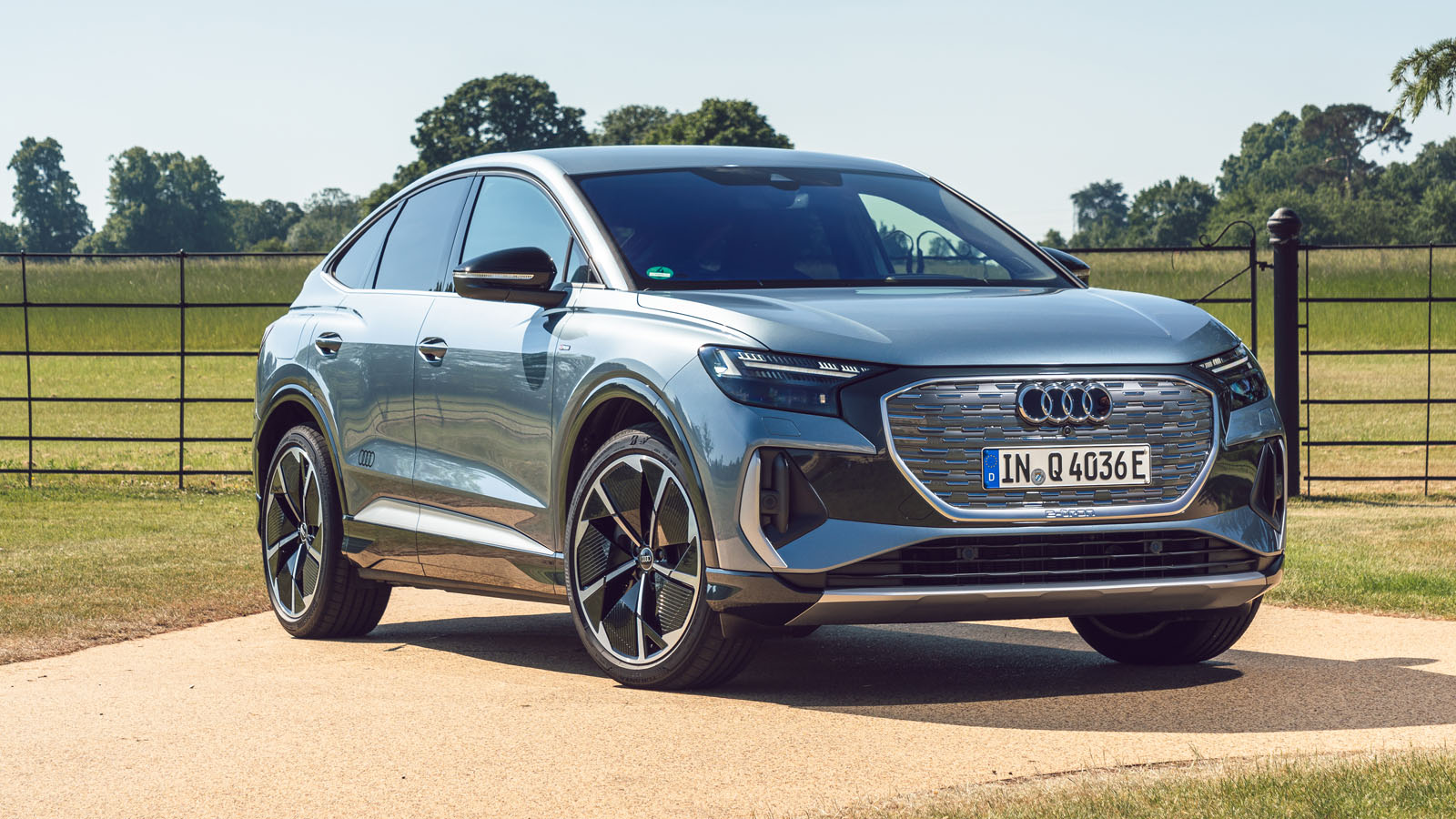
The Q4 e-Tron SUV is Audi’s second attempt at making an electric car, and although its first attempt missed the mark in both price and performance, this is a much better option.
It has a decent range as long as you avoid the small 52kWh battery and also feels brisk to drive; however, the most considerable appeal with the Audi is the luxurious cockpit that’s filled to the brim with a lot of technology.
All versions of the Q4 e-Tron get the Virtual Cockpit as standard, one of the best infotainment systems in all of motoring.
You can get the Audi as a Sportback, but that still needs to do more to improve the driving, which isn’t dull but still lacks the sharpness that some other SUVs can deliver.
In fact, it’s best to get a standard version to use the large rear seating space and the large amount of cargo space in the 520 lire boot.
You should look out for how expensive the Q4 e-Tron SUV can be as you go up the trims. The top-range model is very costly at £67,000, although you can get the entry-level version at £43,000.
Pros
Cons
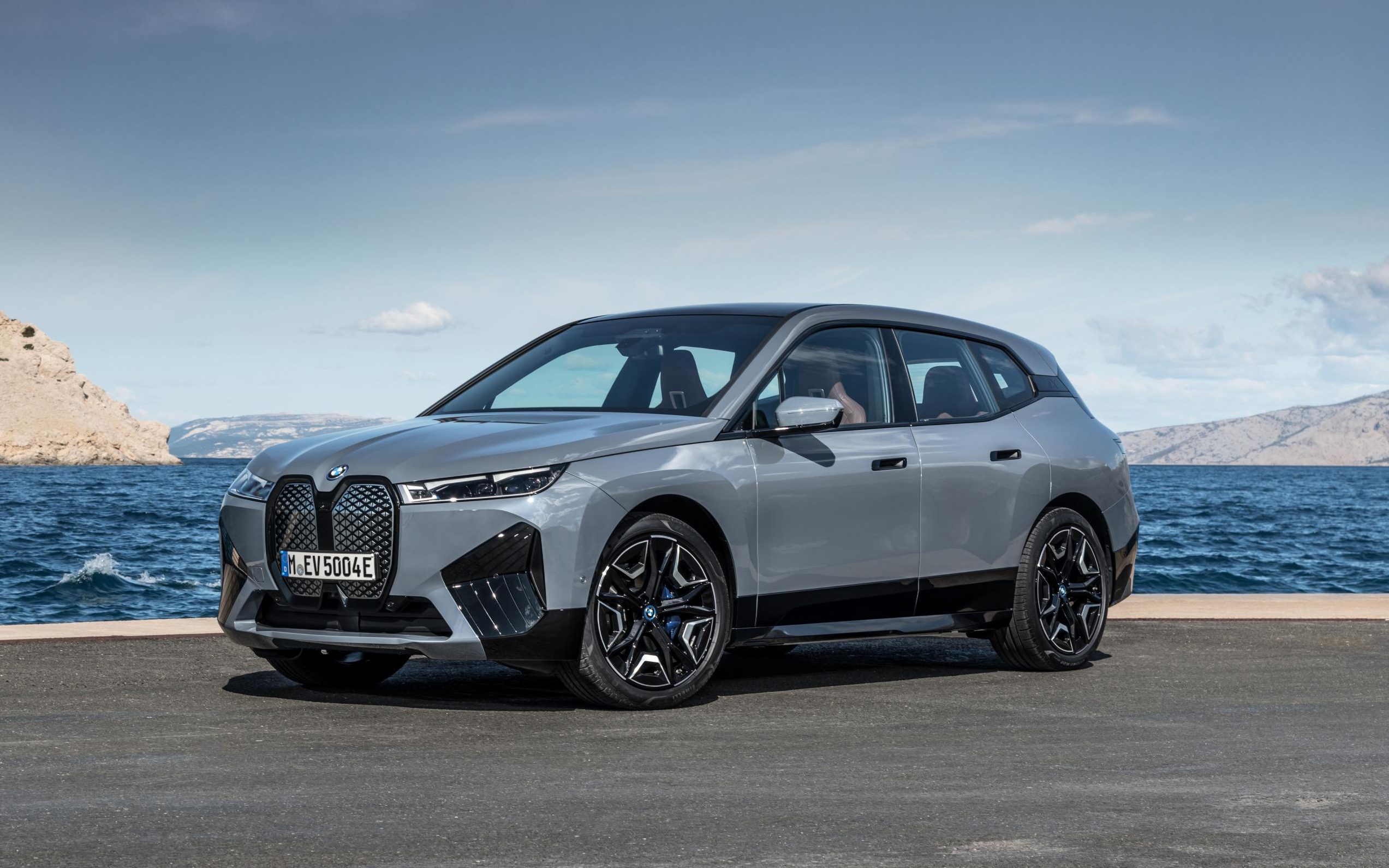
In terms of looks, the BMW iX SUV will not be everyone’s cup of tea. Its front grill does look a little deformed and weird; however, if you can look past the superficial features of the car, you’ll find a compelling electric SUV.
As BMWs first made-for-purpose electric vehicle, this is a great start. It has a lovely interior that offers space and luxurious features like the infotainment system.
Despite being heavy, the car has a lot of power and drives like any other BMW SUV, with the dual motors producing 322bhp in the entry-level model.
The iX SUV range comes to at least 255 miles, which is average, but the top range models can get you as far as 380 miles on a single charge.
It definitely lacks the signature look that draws people towards BMW, but it performs well, has a good amount of space, and offers an economical range.
It is one of the most expensive electric SUVs, which may be off-putting for those who may not like how it looks.
Pros
Cons
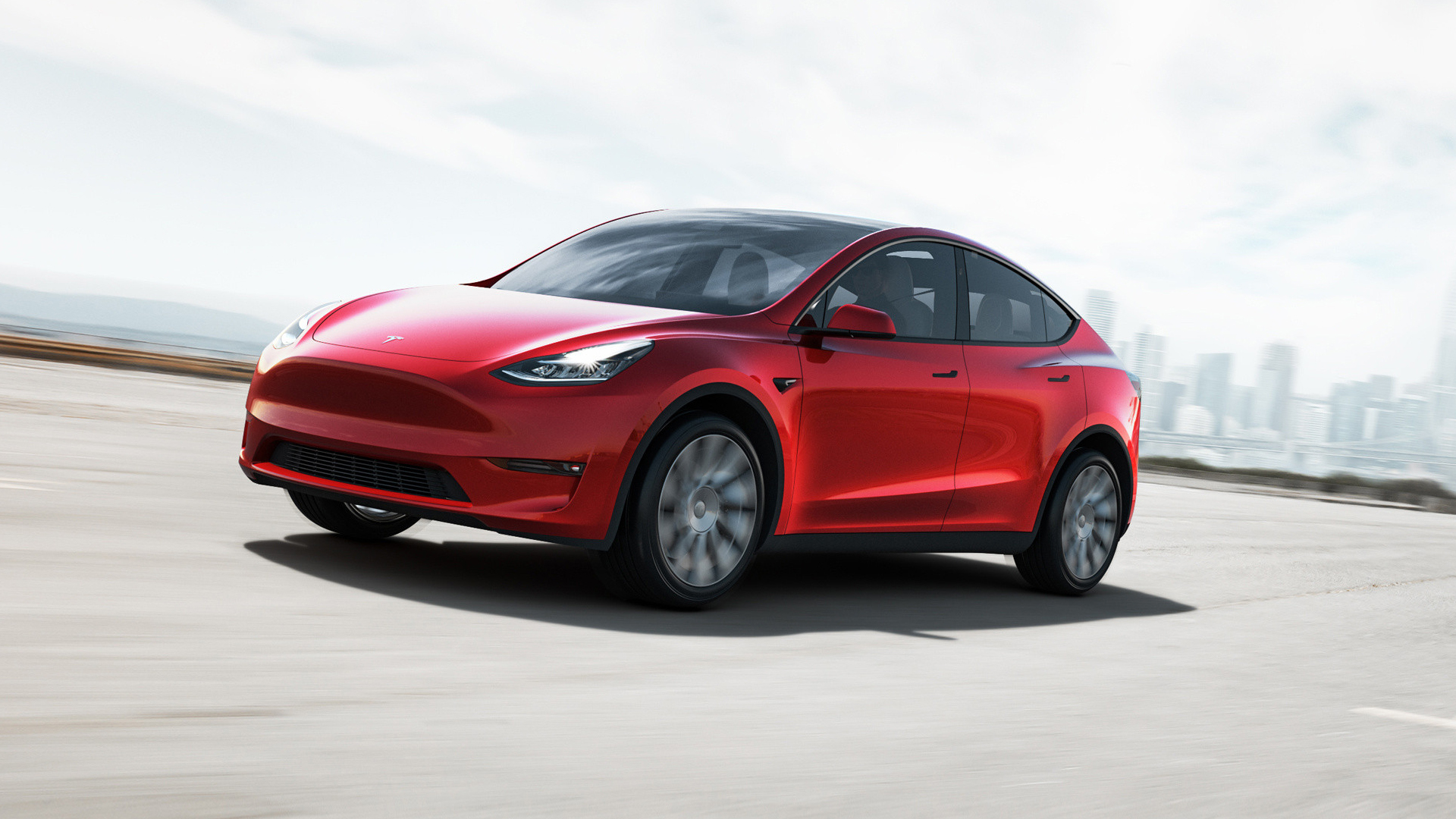
Regardless of what you think about the owner, Tesla is the leading electric car manufacturer, especially after the inexpensive Model 3 hit and swept the nation.
The Model Y is an SUV version of this famous car, keeping most of the basic interior design and the iconic 15-inch touchscreen that dominates the dashboard.
This SUV has a considerable amount of space, as the boot has around 854 litres of space which can fit a lot of essential items, and it also has an additional 117 litres in its front storage space, which is great for small bags.
There are three types of Model Y SUVs: Standard, Long Range, and Performance. With the Long Range, you can get 331 miles per charge, and the performance version can get you from 0 to 60 in around 3.5 seconds, which is as good as some sports cars.
Of course, driving at that high performance will drain the battery much quicker, but as Tesla has a vast fleet of rapid chargers in the UK, that shouldn’t be too much of an issue.
What can be an issue for some is the basic, minimalist interior which can make the car feel void of life and soul.
Pros
Cons

The I-Pace SUV is an attractive electric SUV option because it looks like a hatchback thanks to its low roofline. For some, this can make the car appear stylish and keep the Jaguar charm.
Despite its low roof, the car is still efficient and offers around 650 litres of boot space, which should be plenty for everyday life.
This electric SUV is attractive because it’s a well-performing car that can smoothly accelerate from 0 to 60 in around 4.8 seconds. In addition, its half SUV and half hatchback body make the vehicle more agile and responsive, making it an entertaining electric vehicle to drive.
The downside is that the Jaguar I-Pace is a bit expensive to insure, and it can also cost a lot to have it serviced. Plus, the ride is a little firm, meaning that potholes and bumps in the road can cause some bouncing, making it a little uncomfortable to be driven in.
Pros
Cons
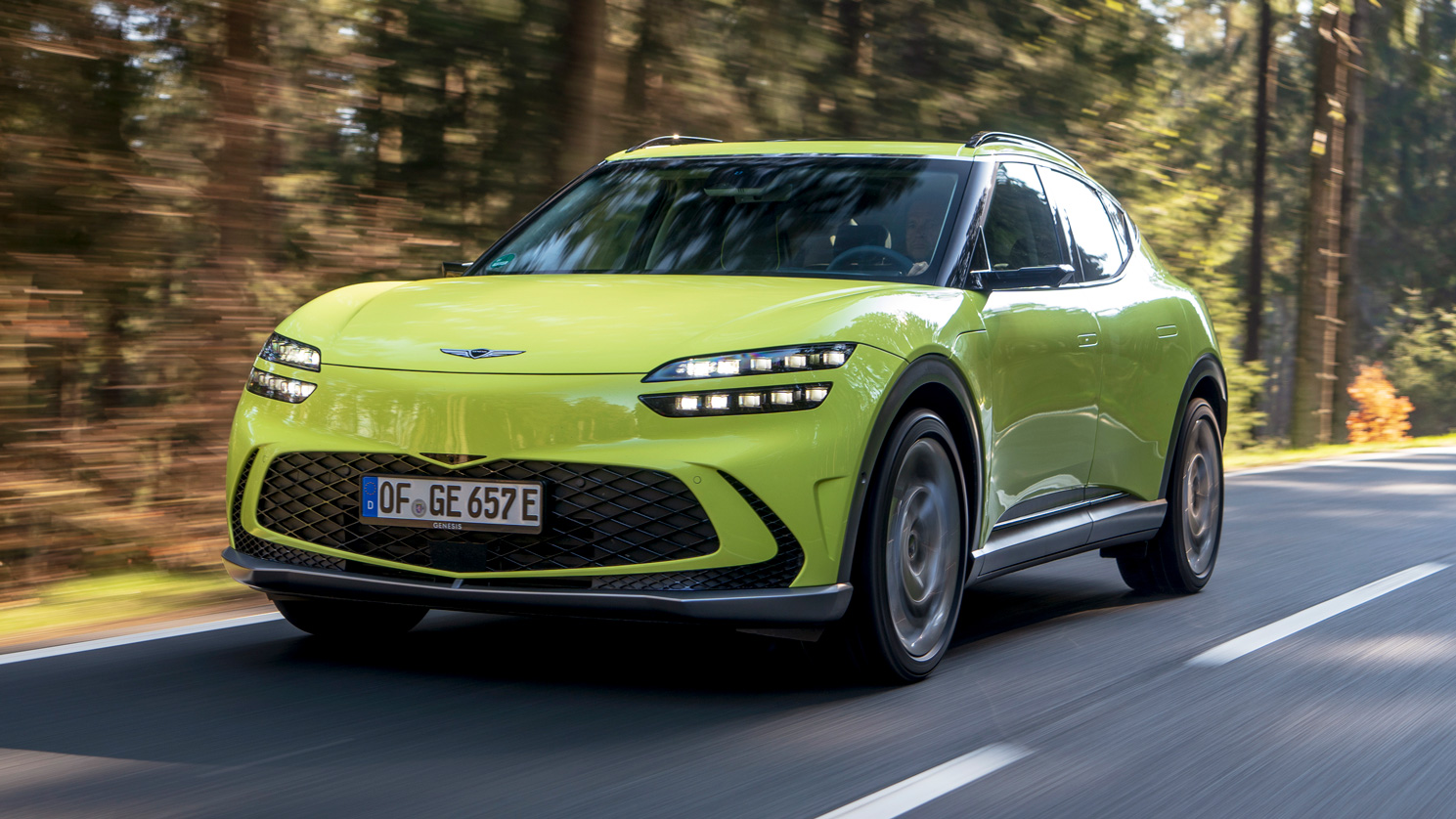
If you weren’t aware, Genesis is the luxury arm of Hyundai, and you can tell with the GV60, a stylish and interesting-looking car that has been limited in the UK.
The GV60 is the brand’s first dedicated electric vehicle, and as first impressions go, it makes a good one.
The exterior is memorable without being too bold and loud, while the interior looks fantastic and feels just as good to sit in.
In terms of driving, the GV60 combines performance with responsiveness well, as the handling makes the driver feel involved with the car, helping to make it a super fun car.
It has 429bhp, which is massive for an electric car, allowing it to feel powerful as it propels you forward.
It has a good range of around 290-321 miles, depending on what version you get, and it also comes with high-speed charging that is superior to some of its competitors.
There’s not much to hate about the GV60, especially as it’s cheaper than some of the other luxury electric SUVs. Its boot space is smaller than other options, and it can ride a little firm, but it remains one of the best electric SUVs.
Pros
Cons
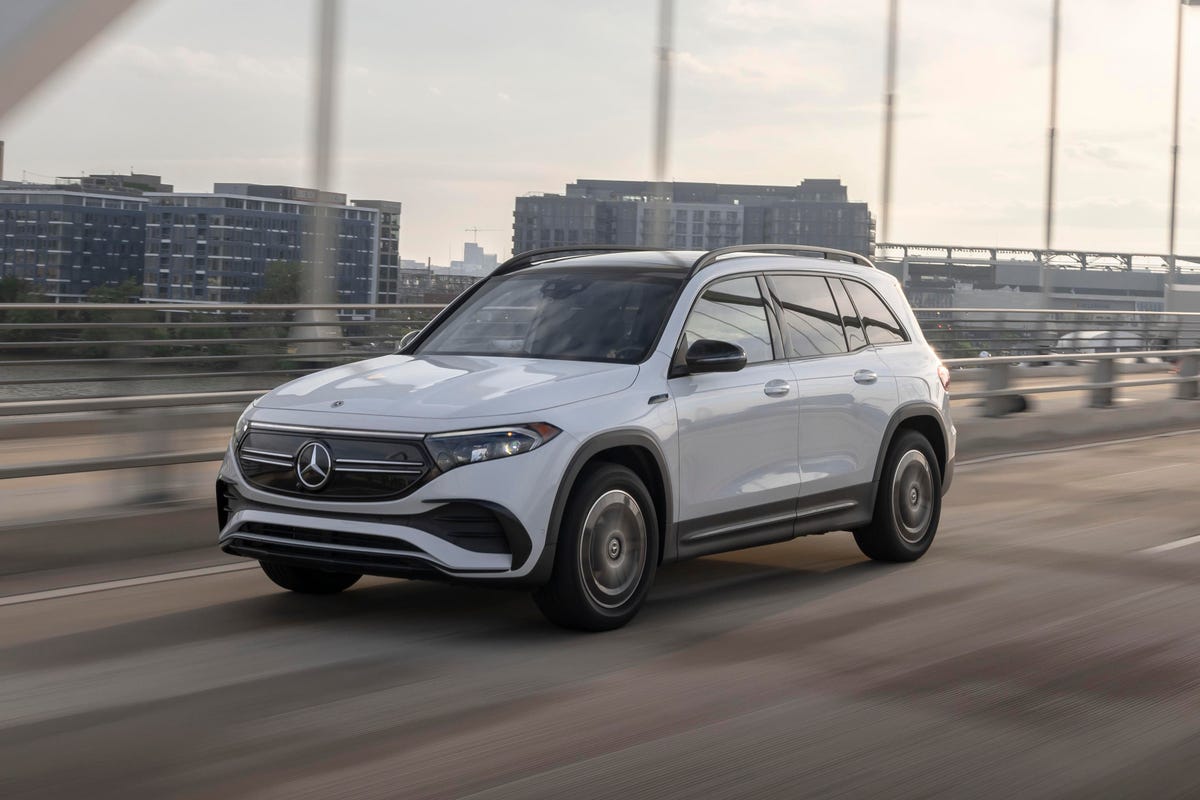
Unlike a few other manufacturers on this list, the EQB isn’t Mercedes’s only electric car option. However, it may be the best for you as an electric SUV, as it’s the most practical and one of the cheapest out of their EV range.
Although it’s a bit compact compared to other SUVs, it still has plenty of room for seven people, meaning that it’s a super helpful people carrier that’s also a tad easier to drive and manoeuvre.
The exterior is sweet and simple and offers just enough to provide that classy look you’d expect from the brand. The interior is functional while being a little flashy, but that’s what you want from a car like this. As it’s smaller, it does lack boot size, although there should still be enough for typical cargo.
The car is four-wheel drive, giving it a good grip on the road, and it uses its minimum of 225bhp well as it drives smoothly and effortlessly despite the size of the vehicle.
It has an average range of 250 miles, which is serviceable for shorter or longer trips, although it can take some time to charge once flat.
Pros
Cons

If you’re looking for a comfortable electric SUV, the Skoda Enyaq is an excellent option for you. The car is spacious and offers a lot of room for passengers, making it a good choice for long-distance travelling.
The car has a pretty good range, which can be relied on. With a standard range of 333 miles, this car has more than it takes to get you across large distances easily.
The car is very well made, with tight panel gaps, and also looks incredible on both the inside and outside.
It has reasonable performance but is slower than some of the other options mentioned in this list.
Instead, it’s a very good all-rounder and performs well in all aspects you’ll want an electric car to do well in.
Pros
Cons
If you're in the market for an SUV because you need something that is both safe and spacious, then you should also consider the electric versions of these cars. There are a few advantages to doing this.
Because these cars produce no emissions, you will only have to pay road tax in 2025, which can help you save a bit of money.
Also, suppose you live in a major city like London, Manchester, or Birmingham, for example. In that case, the low emissions produced will mean that you won't have to pay any emission charges, making them even cheaper to run and operate.
Additionally, as electric SUVs are quieter, they can be much more comfortable to drive. This can be a bonus if you have a young child and want them to relax and sleep in the car. The lack of engine noise will make it a much calmer environment for them to do so.
Plus, a benefit for electric cars as a whole is that because there's no engine, it makes mechanical failures a bit less likely, meaning that you may save money on serving and repairs.
There are a lot of parts that go into an engine, and these parts have the potential to break. Without them, your car is much more reliable.
The range of each electric SUV will vary depending on the model. However, on average, an electric SUV can travel 300 miles before the battery is completely flat.
Of course, some low-range options will not be able to reach this average, while some options can substantially outperform this number.
Some of the best electric SUVs can get a range of around 500 miles, which makes them a pretty practical car.
Similar to the range that electric SUVs have, the time it takes for each one to be fully charged can differ between the models and the car's condition. Plus, the outlet or charger used to charge the electric vehicle can also influence how long it takes.
There are typically two types of electric vehicle charging stations, level 2 or level 3. A level 3 charging station will be quicker at charging a car than a level 2 station. On average, it takes a level 2 charger an hour to charge about 20 miles of range per hour. If your car has a range of 250 miles, it will take about 12 hours to get to full battery.
A level 3 charger is much quicker and can charge a car in under 30 minutes. The issue is that level 3 chargers are less prominent and also cost a bit more to use.
When charging at home, you may use your household outlet, which will be level 1. With this rating, it could take around 40 hours to charge the electric car fully.
Charging an electric SUV is much cheaper than refuelling a classic car's petrol tank. Each charge from a charging station will cost around £20 for a full charge, which means that you can save a pretty good amount of money if you get an electric car with a good range that doesn't need to be charged often.
When charging at home, you'll see the extra cost on your monthly energy bill. If charging at home regularly, you could see an increase of £100-£150 used on charging your electric SUV.
The manufacturer will determine a car's recommended lifespan, so the time each electric SUV is said to last will be different. That said, on average, it's believed that any electric vehicle will last around 200,000 miles.
Some manufacturers will promise much more than this, suggesting that the lifespan of electric cars is improving quickly.
You'll find that the vast majority of electric cars will be automatic, meaning that they haven't got a gearbox, and you won't need to change gears yourself.
There are only are few exceptions to this, meaning that most of the cars you find will be automatic.
For those who have learned how to drive with a manual gearbox, this may take some getting used to. For some, the lack of shifting gears can remove some of the fun from driving.
The short answer is yes; the UK has adopted electric cars with open arms, meaning that many petrol stations, supermarket car parks, and other locations have started to install charging ports for all-electric vehicles.
This should mean that if you're planning a road trip all across the UK, there should always be a place for you to stop and recharge your vehicle.
You can use multiple apps to help you find your nearest charging port, making it easy to plan your journeys.
Most electric vehicles and chargers in the UK are compatible, meaning that you should be able to charge your car on any available charger.
The only exception is Tesla charging stations, which are exclusive to electric vehicles with an onboard Combo CCS charger. This can be annoying, as the Tesla charging stations are considered the gold standard in the industry.
As well as this, you'll need to use your manufacturer's specific charging cable to access superfast charging for your electric SUV. These should typically come supplied when you first buy the car.
For the time being, you don't have to pay any road tax for electric vehicles. This is because road tax works off emissions, so not producing anything means that these types of cars are omitted.
However, things will change. In 2025, all-electric vehicles will have to pay road tax in the UK, which is a bit of a blow for electric cars, as it does mean that it will no longer have one of its major selling points.
Still, the tax will be lower than most other vehicles, so you should still make a saving when getting an electric car.
The price range for an electric SUV is widely varied, with a lot of fluctuation between the cheapest and most expensive options.
On average, though, electric cars are more expensive to buy when compared to traditionally fuelled options. We have a list of best electric cars under £10k if you want some budget options.
When buying new, electric SUVs can range from £30,000 up to £70,000 for some of the best models. You can expect to get SUVs with large mileage per charge and other features when paying higher prices.
| Cookie name | Active |
|---|